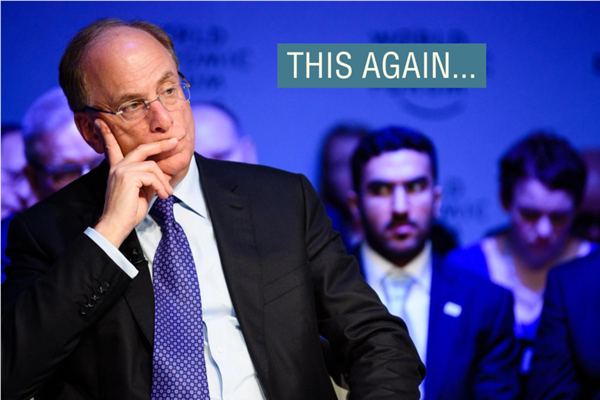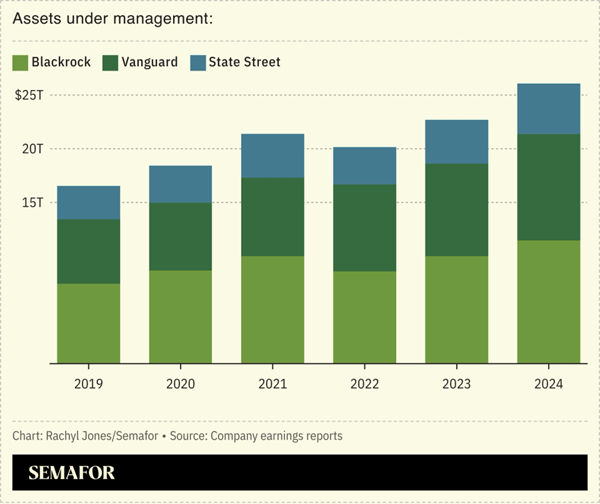
INTELLIGENT §
TRANSPARENT
§
GLOBAL
|
Giant money managers catch
Washington heat
Oct 15, 2024,
1:09pm EDT
business
|

World Economic Forum/Manuel Lopez
|
 The
Scoop The
Scoop
BlackRock is under fire from a federal agency, which is itself a
target of Washington scrutiny, over its influence in corporate
boardrooms. It’s fighting back.
The Federal Deposit Insurance Corp. wants to impose sweeping limits on
how giant asset managers invest in US banks. The agency’s concern is
that BlackRock, Vanguard, and other big money managers wield too much
influence over lenders that decide what gets built in America.
The effort has the rare backing of both Republicans on the FDIC, who
think giant asset managers are too liberal, and Democrats, who think
they’re simply too big. Two defining forces in corporate America —
concerns over “wokeness” and monopoly power — are colliding, and the
ensuing fight is likely to touch on a third: private-sector backlash
against expanding
regulatory power.
The FDIC’s proposal to BlackRock and Vanguard, delivered Oct. 4, would
bar them from trying to influence a bank’s behavior by, for example,
nudging it away from financing oil projects — a nod to the past ESG
priorities of BlackRock CEO Larry Fink. It would also require them to
disclose any conversation their employees have with bank executives,
and to notify the FDIC every time they acquire more than 10% of the
shares of a bank — a level BlackRock already holds at about 40
lenders, people familiar with the matter said.
The FDIC “may request such additional information at its discretion,”
the draft agreement says, which has left executives concerned that
they’re signing up for a new permanent overseer. The agency set an
Oct. 31 deadline for BlackRock and Vanguard to sign the agreements
limiting their actions.
Without a deal by that date, BlackRock and Vanguard could be forced to
sell hundreds of millions of dollars worth of bank stocks — not ideal
for a sector still bruised from last year’s mini-crisis. The agency
can extend the deadline.
BlackRock executives pushed back in a call with FDIC staff in recent
days, the people said, arguing the rules are unworkable for funds that
trade in and out of positions frequently to match indexes. Some of the
rules would kick in at a 5% stake, which both BlackRock and Vanguard,
because of their sheer size, hold in nearly every public company.
The push shows how FDIC Chair Martin Gruenberg, who agreed in May to
resign after an investigation found pervasive sexual harassment at the
agency, is determined to govern right until the end. He has also
proposed new rules on deposits and is holding up a rewrite of new bank
rules for being insufficiently strict, Semafor
has reported.
On the asset manager front, current rules allow investors to own big
stakes in banks so long as they remain passive — although, as Jonathan
McKernan, the Republican FDIC director who proposed the new rules in
January, has pointed
out, it’s a loose system of self-reporting.
“The Big Three purport to be merely passive investors, but a growing
body of evidence suggests that’s not always the case,” he said in
a speech earlier this year, referring to BlackRock, Vanguard, and
State Street.
The FDIC and BlackRock declined to comment.
A Vanguard spokesman said: “Consistent with our mission and passive
approach, we have taken strong actions, engaged with policymakers, and
suggested additional reforms that further clarify and refine
expectations around passivity.”
 Liz’s
view Liz’s
view
This seems like a solution in search of a problem. By BlackRock’s own
tally of its voting record, which is publicly available, it sided with
management in 1302 of 1304 items that appeared on banks’ annual
ballots since 2022, according to a letter it sent to the FDIC seen by
Semafor. Over that period, it bent the ears of executives over some
issue or another at just 12 banks. BlackRock engaged with 1,662
companies over the first half of this year alone. (To be
fair, the fact that it was able to give the FDIC those numbers
suggests that monitoring those meetings would not, in fact, be all
that onerous.)
But more broadly, BlackRock is getting out of the business of pushing
social causes on corporate boards as quickly as it can. It dropped out
of an alliance committed
to cutting carbon emissions and made it easier for fund investors to
vote their shares according to their own preferences. As the mood
around ESG has soured over the past two years, BlackRock CEO Larry
Fink, once
its most vocal proponent, has gone all but silent on the
topic. Vanguard, which was only ever lightly in moralizing business,
has also backpedaled.
When then-Sen. Pat Toomey published a report in 2022 that accused
BlackRock, Vanguard, and State Street of using “investors’ money to
advance liberal social goals,” he may have had a point, though a
quickly dulling one. When the House Judiciary committee accused them
of being part of a vast left-wing conspiracy, it
didn’t.
In 2021, BlackRock voted
to require JPMorgan to conduct a racial-equity audit, over
Jamie Dimon’s objections. This year, JPMorgan’s cause-cluttered ballot
included measures on racial equity, carbon emissions, indigenous
people, human rights, and animal welfare. BlackRock voted
against all of them.
 Room for
Disagreement
Room for
Disagreement
“BlackRock’s extensive voting guidelines are
all about governance. I’m not sure there’s a way to be a truly passive
investor if you’re voting on director independence, over-boarding,
etc,” said Alex Thaler, CEO of Iconik,
which makes software that helps shareholders vote their shares. “Every
vote expresses a preference about how to create value or align with
values. You can’t get away from that.”
© 2024 SEMAFOR INC. |


